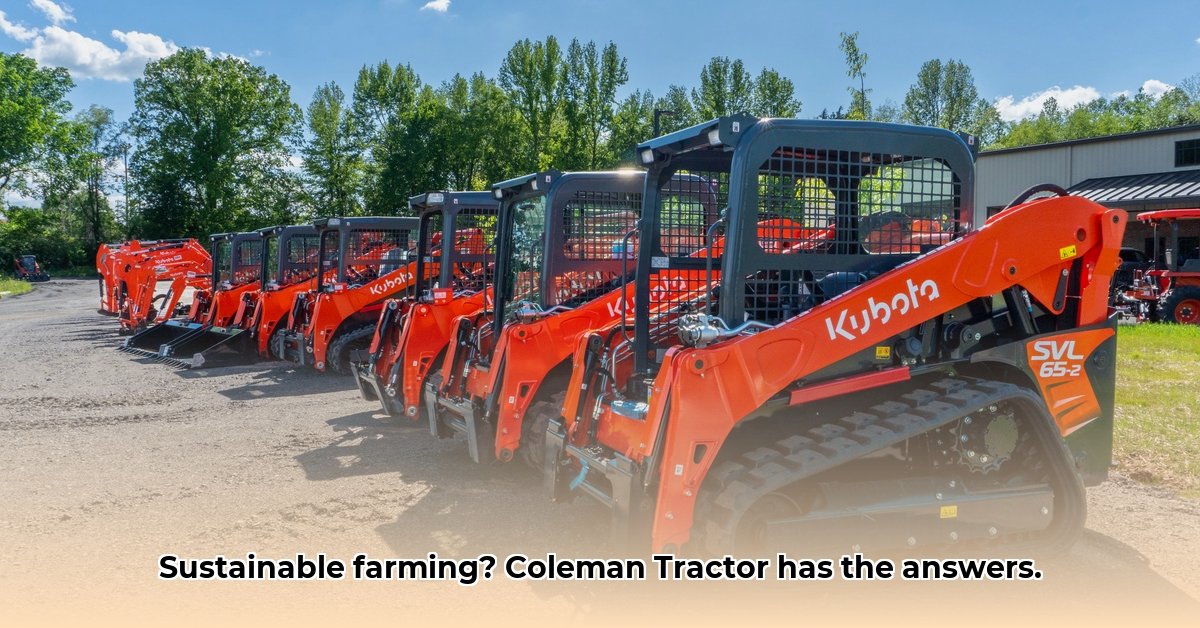
A Case Study in Sustainable Agriculture Equipment Distribution
Coleman Tractor in Clarksville, Tennessee, stands as a compelling example of successful sustainable agriculture equipment distribution. This case study examines its business model, key success factors, challenges, and opportunities for future growth, highlighting the importance of collaboration among stakeholders to build a more sustainable agricultural ecosystem. It explores how a strong brand, value-added services, and strategic location contribute to thriving in a dynamic market, while examining the need for increased sustainability transparency and product diversification. For other equipment options, check out local tractor suppliers.
Coleman Tractor's Business Model: Beyond the Tractor Sale
Coleman Tractor's success extends beyond simple equipment sales. Their business model centers on providing a comprehensive package to farmers: sales of primarily Kubota equipment, free delivery within a 100-mile radius, expert repair services, and extended warranties. This holistic approach fosters strong customer relationships, crucial in the rural farming community where trust is paramount. "Our customers rely on their equipment to put food on the table," says Sarah Miller, Sales Manager at Coleman Tractor. "Our commitment to service ensures minimal downtime during critical planting and harvest seasons." The dealership's strategic location in Clarksville also provides easy access to a large agricultural area, enabling quick response times for parts and repairs – a critical advantage for time-sensitive farming operations. Don't farmers value this readily available support?
Success Factors: Building a Foundation of Trust
Coleman Tractor's success rests on several pillars:
- Strong Brand Association: Their partnership with Kubota, a reputable brand known for quality and reliability, provides immediate customer trust. This translates directly into sales and loyalty.
- Value-Added Services: Beyond equipment sales, Coleman Tractor delivers exceptional customer service through readily available repair services, extended warranties, and free delivery within a 100-mile radius. This commitment to after-sales support significantly builds customer loyalty.
- Strategic Geographic Positioning: Their Clarksville location allows them to effectively serve a large agricultural area, minimizing travel time for farmers and ensuring a prompt response to equipment needs.
Challenges and Opportunities: Navigating the Path Forward
While Coleman Tractor enjoys significant success, challenges remain:
- Limited Product Diversification: Their focus on Kubota and a few other brands limits their ability to cater to farmers seeking specific or more sustainable equipment options.
- Lack of Sustainability Transparency: The absence of publicly available data on their own sustainability practices (e.g., carbon footprint, waste management) limits their ability to attract environmentally conscious customers.
These challenges present significant opportunities:
- Expanding Product Offerings: Adding environmentally friendly options, such as electric tractors, aligns with growing farmer demand and strengthens their brand image.
- Improving Sustainability Transparency: Publicly sharing data on their environmental performance and obtaining relevant certifications would build trust and attract a wider customer base.
Conclusion: A Collaborative Path to Sustainable Agriculture
Coleman Tractor's success story highlights the importance of comprehensive service, strong brand partnerships, and strategic location in the agricultural equipment market. However, embracing opportunities in sustainability is crucial for continued growth. Expanding product lines to include sustainable options, enhancing transparency around their environmental performance, and collaborating with Kubota, farmers, and local government can help establish Coleman Tractor as a leader in sustainable agriculture. This collaborative approach ensures a prosperous future not just for Coleman Tractor, but for the entire Tennessee farming community.
Appendix: Actionable Steps for Stakeholders
The following table outlines actionable steps for key stakeholders to foster a more sustainable agricultural ecosystem:
| Stakeholder | Short-Term Actions | Long-Term Goals |
|---|---|---|
| Coleman Tractor | Expand service offerings; Begin reporting key environmental metrics; Invest in employee training for sustainable practices. | Develop and implement a full ESG framework; Transition to sustainable operations; Diversify product offerings to include more sustainable technologies. |
| Kubota Corporation | Increase the availability of sustainable agricultural equipment; Develop robust training programs for dealers on sustainable technologies | Lead the industry in sustainable agricultural equipment; Create comprehensive support systems for dealers’ sustainability initiatives |
| Tennessee Farmers | Utilize equipment warranties effectively; Explore precision farming; Adopt sustainable practices. | Transition to more efficient farming methods; Reduce environmental impact |
| Local Government | Implement incentive programs for sustainable equipment and practices; Support educational initiatives on sustainable agriculture | Foster collaboration across stakeholders to promote sustainable agricultural practices throughout the region |
This collaborative approach positions Tennessee agriculture for a future of both prosperity and environmental responsibility.